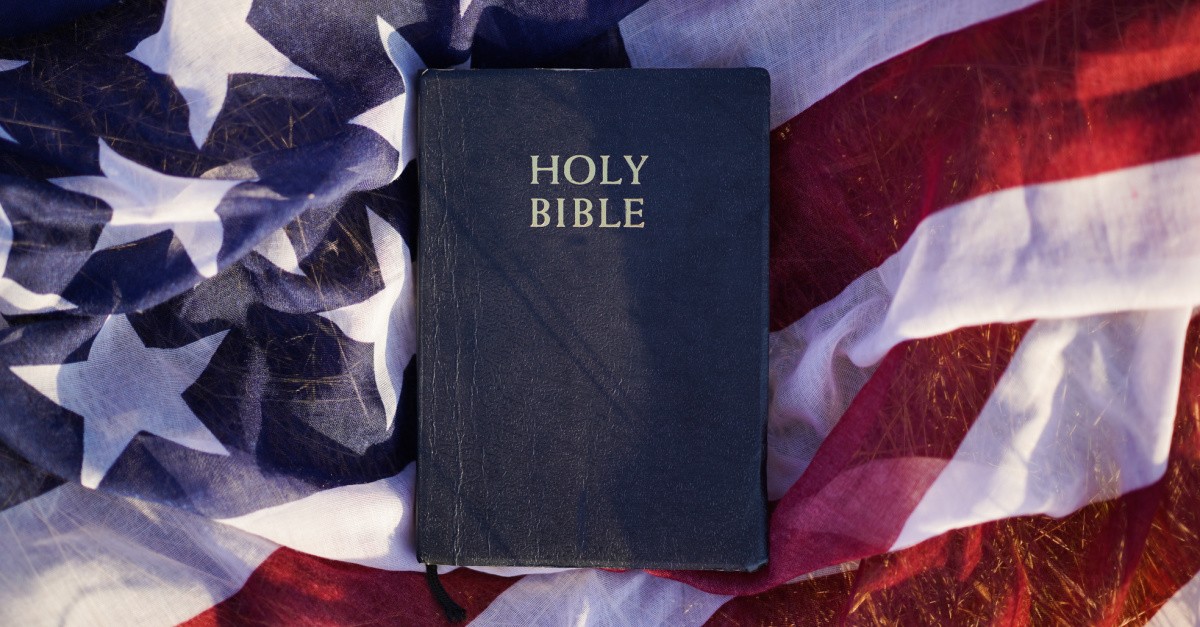8 Lessons from the Founding Fathers We Need to Hear Today
Slideshows


Audio By Carbonatix
By Britt Mooney, Crosswalk.com
The Founding Fathers get a bad rap sometimes. They had their flaws, as we all do, and yet they accomplished a world-changing revolution, one that men realized would be a process, which continues to have an impact today. The new constitutional republic system has been imitated across the world, with almost 90 countries having a similar system based on the ideals of individual rights and liberty.
The American Founding Fathers were the leaders who influenced and led the American Revolution against Britain and shaped the birth of the United States. They included people like George Washington, Thomas Jefferson, John Adams, Benjamin Franklin, Alexander Hamilton, James Madison, and others. These men debated, compromised, and built the foundation of a new nation, which resulted in a legacy in America and in the world.
Despite their flaws and personal struggles, these leaders have important lessons to teach us today.
Photo Credit: ©Unsplash/Alondra Oliva

1. God’s Providence Rules Human History
As Christians and Deists, the Founding Fathers believed in the providence of God. They understood the Lord reigned over human history. Biblically, we see the same truth expressed through verses like Daniel 4:17, “The Most High rules the kingdom of men and gives it to whom he will.” Daniel declared such truth while a slave under the Babylonian Empire. While not someone with political power, Daniel stood before a king and shared how God (the Israelite God) ruled sovereign over even recent events.
George Washington wrote about divine providence in his letters and speeches, regularly giving God credit for the success of the Continental Army. After the Patriots won the Revolutionary War, Washington wrote that no one had more reason to believe in God’s sovereign hand than the United States. He acknowledged their victory came more from the Lord’s intervention than military might.
While not orthodox in his doctrine, Benjamin Franklin called for prayer at the Constitutional Convention, where they penned the US Constitution. He reminded them of their national and international responsibility and how they needed God’s help.
God isn’t distant. He raises up leaders and brings them low. The Lord steers history toward his purposes. This humbles and helps us understand God’s work on the earth, even through bad rulers, having faith that God will work it out for good in the end. Unfortunately, America took this idea of destiny without humility, often associating its evils with God’s favor. May we not do so today.
Photo Credit: ©Unsplash/Stephanie McCabe

2. Freedom Requires Moral Virtue
The modern idea of freedom often entails “doing what I want.” However, the Founding Fathers understood freedom differently. Freedom had to include personal responsibility to do what is right. 1 Peter 2:16 teaches, “Live as free people, but do not use your freedom as a cover-up for evil; live as God’s servants.” The apostle instructs how true freedom submits to God and his morality, which results in our good and the good of others. We pervert freedom when we use it to do evil.
John Adams famously wrote, “Our Constitution was made only for a moral and religious people. It is wholly inadequate to the government of any other.” He and the Founders had studied history, with governments of all types. The republic (allowing for maximum self-government) could only be sustained if the citizens practiced self-control, could trust one another, acted honestly, and honored justice. Without virtue, chaos ensues, and tyranny (government control) becomes the only option left.
The Founders also understood Christianity to provide such a virtuous framework. They saw the Bible as useful to teach ethical behavior leading to freedom.
Our modern communities must learn the same. Without a common sense of virtue, freedom allows people to hurt one another and act selfishly, and society destroys itself through anarchy or tyranny. The same is true of our own hearts. Taking the idea of God’s grace as freedom to sin becomes “licentiousness,” leading to bondage. But living self-sacrificially leads us to the life and community we long for.
Photo Credit: ©Unsplash/Courtney Hedger

3. All Humanity Is Created Equal
Because the Founders were Christians, devout to some degree, or Deists, they believed every person was created by God and carried the inherent image of God. This core identity made everyone equal in value, none more than another. This idea comes from Judeo-Christian ethics alone. No other religion of the ancient world espoused this.
Paul points to the spiritual value of every person in Galatians 3:28. “There is neither Jew nor Gentile, slave nor free, male nor female, for you are all one in Christ Jesus.” Our intrinsic value goes deeper than the external and the seen, to the spirit. And no human law bestows this value; it comes directly from the divine Creator. Therefore, Thomas Jefferson wrote in the Declaration of Independence, “All men are created equal, endowed by their Creator with certain unalienable rights.” Unalienable means those rights are so basic to humanity, and given by God, that no earthly person or power can separate them.
Unfortunately, the Founders struggled to apply this fully, compromising with some Americans who actively participated in slavery. Even so, this idea influenced the abolitionist movement (the cause to end slavery) from even before the Revolutionary War and undergirds the fight for equality up to today.
These civil rights movements have improved the country and made great strides. However, we still wrestle with division, inequality, and racism. We must remember where this ideal came from, the Creator, and was expressed in his written Word, so we need to return to God to have the unity and equality we desire. Equality didn’t come from a humanistic or atheistic source, but from God. It’s a Gospel truth for us to seek in everyday interaction and public policy.
Photo Credit: ©Unsplash/ Ian MacDonald

4. Prayer and Fasting Have Power
When people get desperate, they turn to prayer, even if they aren’t specifically devout. The Founding Fathers led a nation that believed in Christianity, so they assumed prayer and fasting could be ways to help them in their plucky fight against the most powerful empire on earth, the British. A famous verse from 2 Chronicles 7:14 echoes this belief:
“If my people, who are called by my name, will humble themselves and pray and seek my face and turn from their wicked ways, then I will hear from heaven … and heal their land.”
During the Revolutionary War, the Continental Congress called for national days of prayer, fasting, and humiliation. These requests went out to the population of Patriots. The Founders acknowledged their desperate situation, and they needed the Lord’s guidance and favor. George Washington led his troops during these times. John Adams wrote that fasting and repentance led to the virtues needed to win the war and keep the freedom they sought to win.
We all recognize the deep division and confusion in our nation today. The solution isn’t political but spiritual. God responds to humility and truth. No nation can survive, much less thrive, apart from God’s guidance. To address the modern conflicts, we must once again call each other to prayer and fasting, not as a ritual, but to seek God’s face and see him bless us with unity and peace.
Photo Credit: ©Unsplash/Cara Rodriguez

5. Religious Freedom Honors the Individual (Romans 14:5)
Finding religious liberty was one reason some came to the Americas to settle. In principle, the American Founders closely tied religious freedom to individual conscience. They believed in God, but they couldn’t and wouldn’t force such a choice. Every person must follow their conscience and be free to do so.
This aligns with the New Testament, where the apostles and evangelists would make passionate appeals to obey the Gospel, but they would not force or manipulate any to do so. The all-powerful God could make us worship him, if he wanted, but he doesn’t out of his desire to have a real, loving relationship, not tyranny. Therefore, as his followers, we should remember the same love. The apostle Paul says in Romans 14:5, “Let each be fully convinced in his own mind.” The Bible holds conscience as a sacred thing, like the image of God, and the Founders gave religious liberty for the same reasons.
Jefferson’s Virginia Statute for Religious Freedom declared no one should be forced to support any religious worship or ministry, and that faith must be directed by reason and personal conviction, not by law or coercion. Madison also believed civil government should protect conscience, not invade it. These ideals led to the First Amendment, allowing the free exercise of religion.
We should remember this today, with the right to free speech, we make Gospel appeals out of humility and love, not power and law. In this, those who receive him do so freely, not from force.
Photo Credit: ©Unsplash/Andy Calhoun

6. Leadership Equals Sacrifice
Biblically, leadership doesn’t exist for power or wealth. Jesus taught servant leadership, where those with responsibility over others do so with self-sacrifice. Christ addresses this with his disciples in Matthew 20:26-28: “But whoever would be great among you must be your servant … even as the Son of Man came not to be served but to serve, and to give his life as a ransom for many.”
The leaders of the American Revolution gave their lives for the cause. Many were wealthy, educated, and secure in their communities. They risked it all to fight for liberty—homes, fortunes, reputations, and their safety. The men who signed the Declaration of Independence clearly stated their rebellion against a king, pledging “our lives, our fortunes, and our sacred honor.” Some were later captured or lost family members. Some died penniless and under threat.
George Washington refused a third term as president (one he would have easily won) to make sure he modeled how leaders shouldn’t exist to take personal power.
Biblical leadership means sacrifice, choosing the harder path for the benefit of others. For us today, we still see leaders as their own kingdoms, image, and influence. To shape our communities with blessing, we must lead with self-sacrifice, bravery, and a commitment to others.
Photo Credit: Thomas Kelley/Unsplash

7. Nations Must Repent of Sins
As we’ve discussed already, the Founding Fathers weren’t perfect. They inherited the colonial version of slavery and didn’t properly address it in their lifetime, even though several among them recognized its evil and spoke out against it. In addition, the American government broke agreements and dealt violently with native American tribes.
The Founders had expressed the need for virtue, yet these sins remained. Proverbs 14:34 states, “Righteousness exalts a nation, but sin condemns many people.” Believers must courageously stand up against injustice and call people to repent, for the good of the nation. This is love.
Although a slaveholder himself, he wrote about how slavery was a moral and national crisis. “I tremble for my country when I reflect that God is just,” he said. Benjamin Franklin became president of an abolitionist society. John Adams also called slavery an evil. These men and others saw the contradiction and hypocrisy between “all men are created equal” and slavery. While they failed to remove it in their lifetime, the Founders’ ideas and writings led later abolitionists and civil rights leaders to make progress against this injustice using Scripture and the American founding principles.
While America has come a long way, we must continue to apply this lesson. Every generation must address injustice in its own time and context. We should confront national sins—like racism, greed, violence, and killing the unborn—and call people to turn to God.
Photo Credit: ©Getty Images/Anastasiia Stiahailo

8. God Uses Imperfect People
We can condemn the Founding Fathers for sin, but God has used imperfect people throughout human history. Many biblical “heroes” fell into great sin. This doesn’t justify sin; it points to God’s mercy and power to move his redemptive story forward despite failures. Paul writes in 2 Corinthians 12:9, “My grace is sufficient for you, for my power is made perfect in weakness.”
The Founders struggled with morality, yet God used them to birth a nation with principles of liberty and justice. Thomas Jefferson tried to make slavery illegal in Virginia, but he owned them, too. Benjamin Franklin lived a worldly, sensual lifestyle but advocated for prayer and righteousness. God worked through their leadership to improve a great deal, but they are still not perfect.
The Bible has similar stories. Abraham lied about his wife twice. God chose Moses, a murderer. David was a man after God’s own heart, but he committed adultery and murder. Peter publicly denied Jesus. Paul once persecuted Christians. In each case, God corrected their sin but continued to use them to further his redemptive will.
If we wait for the perfect leaders to act, or to be perfect ourselves, we’ll never move forward. God uses the weak, the broken, and the faithless in different ways to reveal his glory. We should seek his face to live holy and righteous, with integrity. At the same time, let us remember we’re not perfected yet. We should give each other some grace and mercy as God does with us.
Photo Credit: ©Getty Images/Darwin Fan


























